No Christmas in Bethlehem
Five hundred participants at the European Parliament Prayer Breakfast in Brussels last Wednesday listened intently to a Palestinian Christian leader and others who are suffering under the Israel-Gaza conflict.
11 DECEMBER 2023 · 10:29 CET

‘Christmas celebrations are cancelled in Bethlehem this year. What should have been a season of joy and hope this year is a season of death and fear.‘
Five hundred hushed participants at the European Parliament Prayer Breakfast in Brussels last Wednesday listened intently as Palestinian Christian leader, Dr Jack Sara, told of the sense of hopelessness and wanton destruction that followed in the wake of the October 7 terrorist attack on Israel.
Christians have been caught in the midst of the Palestinian conflict for a lifetime, suffering from both Israeli security concerns on the one hand, and on the other from the militant Islamist Hamas group, whose charter calls for the establishment of an Islamic, rather than a secular, state.
Knesset member Sharren Haskel led out in prayer for peace and for the release of the hostages, adding a warning for the politicians, civil servants, diplomats, lobbyists, activists and church leaders gathered in the European Parliament building, that wherever Jews had been persecuted, Christians had been the next target.
Endings and beginnings
A brother of a hostage still held by Hamas described the attack on his kibbutz where he had grown up, had been married and till now had raised his small children. At 6.30am on October 7, he and his fellow kibbutzniks found themselves ambushed by a gang of terrorists. Seven members of his defence squad, his friends, were killed in a few minutes. Escaping to his house, he saw his neighbours dead on the ground, their now-orphaned seven-month-old twins crying inside the house. He texted to call the army but only twelve hours later could rescue the babies.
Now the keynote speaker had the difficult task of following this dramatic presentation. No stranger to challenging tasks, Mr Eduard Heger, the former prime minister of Slovakia, had himself stepped into government leadership after a turbulent history of corruption and misrule by his predecessors. Just last month I had met Mr Heger in Timisoara and asked to interview him for Saturday’s Schuman Talk. It was a pleasant coincidence to discover his name on the programme.
He wanted to talk about endings and beginnings, he began, in that order. The Bible gave many examples of ‘endings’ that became new beginnings, he explained. While we could often only see an ending, God can create a new beginning. Joseph was sold as a slave, yet that led to a new beginning for himself, his own people and also for Egypt. Revenge and conflict, he urged, can be turned into forgiveness and reconciliation. Jesus’ death seemed to be the end for the disciples. But it was the beginning – of the church, and of the global mission movement.
Naivety
In a seminar following on from the breakfast itself, panel members asked how to stop the radicalisation of the Palestinian-Israeli conflict. The complexities and deep-rootedness of the current conflict quickly became apparent as various contributors explained underlying factors often glossed over in the popular media.
No Arab nation will offer 5.9 million Palestinians civil rights or work permits, perpetuating the volatile situation
The original 700,000 Palestinian refugees have multiplied into 5.9 million descendents, all of whom remain in refugee status as no Arab nation will offer them civil rights or work permits, perpetuating the volatile situation.
Western naivety has allowed many terrorist proxies to operate within the EU, claimed one panel member. Yet appeasement was not the answer. To believe that the more we behaved like sheep then the less like wolves they would behave was simply the road to oblivion.
‘Peace on earth and goodwill towards all men’ seem a long way removed from the land where the angels first sang those words. Tragically they will remain absent until there is a changed mentality.
Yet we persist in that prayer for Israel and Palestine, and for Ukraine and Russia, this Advent.
Jeff Fountain, Director of the Schuman Centre for European Studies. This article was first published on the author's blog, Weekly Word.
Published in: Evangelical Focus - Window on Europe - No Christmas in Bethlehem
